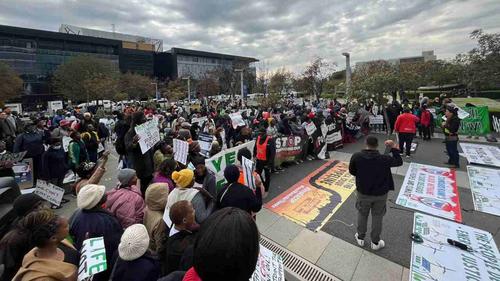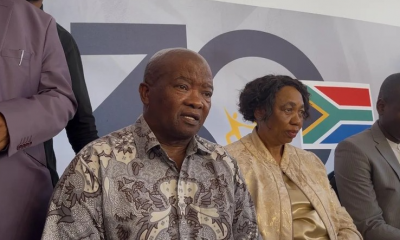Activism
Climate activists interrupt Standard Bank Annual General Meeting

Ten climate activists at Standard Bank disrupted the bank’s Annual General Meeting on Monday morning, demanding that the institution stop investing in fossil fuels and “withdraw any and all support for the East African Crude Oil Pipeline (EACOP) project.” Joined by about 200 protesters under the #StopEACOP campaign, the activists picketed outside Standard Bank’s head office in Johannesburg, calling for a shift in investment towards renewable energy systems that uplift communities, as per GroundUp.
Extinction Rebellion, the action’s organisers, emphasised that Standard Bank should redirect its investments towards renewable energy projects that benefit low-income communities facing “energy poverty.” This term refers to a lack of access to affordable and environmentally sustainable energy services necessary for development, as defined by Habitat for Humanity.
The activists blocked the venue entrance where the Annual General Meeting would occur from 10 a.m. Security personnel removed the activists, kicking and dragging some of them out of the building.
Simultaneously, outside the head office in Rosebank, the activists joined forces with various climate advocacy groups in urging Standard Bank to cease investing in fossil fuels and to withdraw support for the East African Crude Oil Pipeline (EACOP) project.
Also read: According to climate change activists, solar energy is the solution to South Africa’s power crisis
The #StopEACOP campaign has united climate advocacy groups in condemning the pipeline’s construction and Standard Bank’s financial backing. The campaign argues that the pipeline poses risks such as the displacement of thousands of families and farmers, water source contamination, and the potential for oil spills in the Lake Victoria basin, which sustains more than 40 million people. Additionally, they highlight the projected annual carbon emissions of over 34 million tonnes that the pipeline would contribute, exacerbating the climate emergency.
Ulrich Steenkamp from Earth Life Africa expressed, “They must stop financing the destruction of our planet and the uprooting of our communities. It is time to divest from all things related to fossil fuels. EACOP won’t happen on our watch. We are tired of you funding the destruction of our people and stealing our land.”
Members of the community affected by fossil fuel-generated energy shared their experiences. Mummy Mabe, from Tembisa, highlighted the adverse impact of fossil fuels on agriculture due to unpredictable weather patterns and toxic rain, which hinder crop growth. Mabe is actively involved in her community, combating illegal dumping and cleaning streams.
Uhuru Mbele, the founder and programs coordinator of Tosunga Baninga, an organisation aiding survivors of gender-based violence based in Orange Farm, emphasised the link between unreliable electricity supply, load shedding, and high rates of femicide in township communities. Mbele stated that climate change, energy security, and inequality are interconnected.
Similarly, climate activists from Vosloorus highlighted the poor air quality and flooding resulting from fossil fuel mining in their communities.
Also read: Activists Warn of Threat to South Africa’s River Systems From High E. Coli Levels
Apart from urging disinvestment from fossil fuels, the activists demanded that Standard Bank collaborate with communities, especially low-income communities and civil society, to support projects prioritising the eradication of energy poverty.
The activists called for funds allocated to fossil fuel investments to develop renewable energy systems that uplift communities. Extinction Rebellion national coordinator Malik Dasoo stated, “We believe that energy justice should be a fundamental principle guiding Standard Bank’s green energy financing and wish to denounce their greenwashing initiatives.”
During the picket, they did not hand a memorandum over, as climate advocacy groups claim that previous memorandums submitted to Standard Bank received no response.
GroundUp will update the article to include any responses from Standard Bank once received.
Standard Bank’s Response:
Ross Linstrom, the spokesperson for Standard Bank, said, “Access to reliable electricity is one of the biggest challenges in Africa. To this day, half a billion people still don’t have access to grid electricity. One of Standard Bank’s main aims is to ensure that additional access is made possible for citizens of rural Africa through off-grid solar solutions that are cost-effective, greener, faster, and renewable.”
Regarding the East African Crude Oil Pipeline (EACOP) project, Linstrom mentioned that Standard Bank is one of the potential lenders and that an independent environmental and social consultant is conducting due diligence. He stated that the consultant recently completed.
Also read:
Follow us on Google News.






















